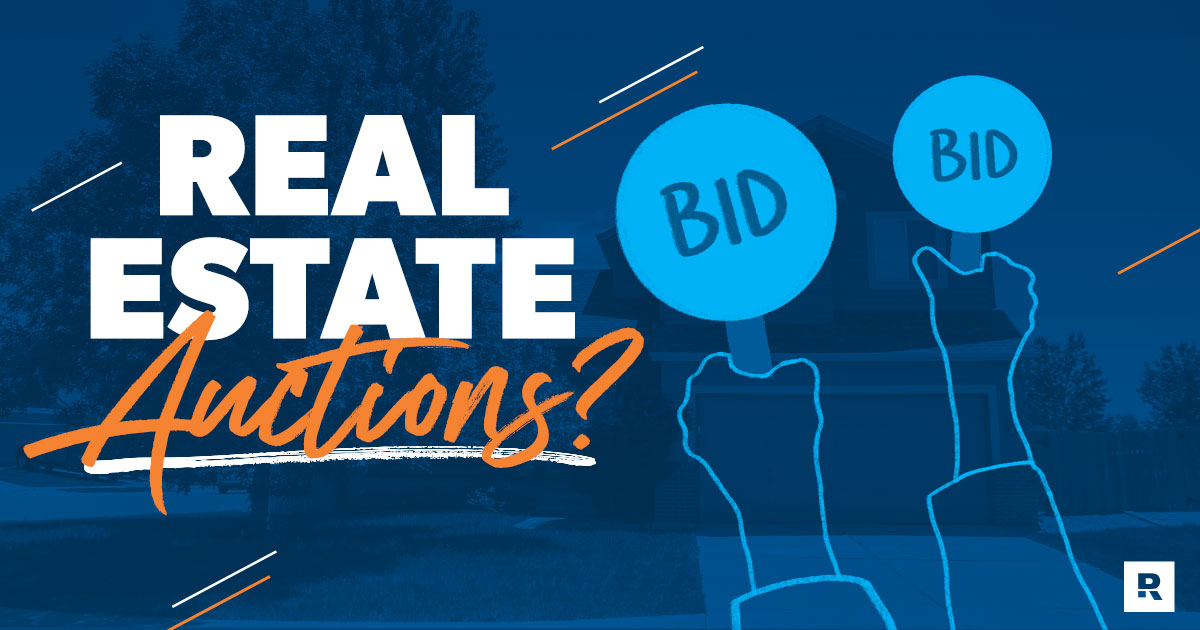
Okay, so you’re looking to buy a house and, when searching online, you notice a lot of homes in your price range that are popping up for sale through auctions. Maybe you’ve even heard that you can get a deal when you buy a house at auction. Judging from the variety of homes available in the listings, it sounds almost too good to be true!
Well, is it? Can you get a deal on a house through an auction? The short answer is yes, you can. But you have to know what you’re doing! Your goal is to get a deal—and when we say deal, we don’t mean saving $4,000. That’s not really a deal. We’re talking about saving major cash—like tens of thousands of dollars.
It is possible to get a bargain like that an auction if you know how auctions work and what to look for when you buy a home at auction, and if you’re patient enough to find the right house at the right price.
Interested? Read on!
How Do Auctions Work?
Okay, first, auctions can be exciting. So you have to careful not to get too excited. It’s like the old comedy movies where Jerry Lewis is sitting at an auction and every time he scratches his nose or tugs his ear, the bid goes higher and higher until the next thing you know, he’s bid $2 million for a vase. You’re probably not going to buy a house by scratching your nose, but you can get carried away by the energy and spirit of competition at an auction and end up paying more than you wanted to. However, be careful not to be too conservative during an auction or you could miss out on a deal!
Find expert agents to help you buy your home.
Now, there are three basic types of auctions and they each work a little differently.
Absolute Auction
In an absolute auction, the highest bid wins. Period. Whether it’s $1 or $1 million, if your bid is the highest, then congratulations! You just bought a house. Absolute auctions generate the maximum response from potential buyers because there’s no minimum bid (more on this in a minute) and the sale is final. A lot of sellers—like banks looking to unload foreclosures and government agencies selling off properties with tax liens—use absolute auctions.
Minimum Bid Auction
This is just what it sounds like: You have to bid a minimum amount to be in the running. You’ll always know what the minimum is before you get started because it’s published in advertisements and the auctioneer will announce it when they open the bidding. Sellers like these auctions because it reduces the risk that they’ll lose money. But they also have to be careful that the minimum bid attracts buyers and doesn’t scare them away if it’s too high.
Reserve Auction
In a reserve auction, the winning bid is treated as an offer to the seller, who then has the right to accept or reject the bid within a pre-specified period of time. Usually, the seller has a minimum bid in mind but doesn’t necessarily want to tell you what it is. They don’t have to sell the home if you don’t meet their price. But typically, if you’re pretty close, the auctioneer may try to convince the seller to take the deal. That’s because auctioneers usually get a commission on the sale, and no sale means they just talked themselves hoarse for no reason.
What Kinds of Homes Are for Sale at Auction?
The two most common types of properties for sale at auction are those seized by banks through foreclosures and houses seized by governments because of unpaid property taxes. Sometimes a house will need to be sold because the owner is going through bankruptcy. There are also times when a couple is divorcing and needs to sell the house quickly. It’s also common for houses to go up for auction when someone dies, and the heirs don’t want it for whatever reason.
What to Look Out for When You Buy a Home at Auction
Here’s where it gets tricky. In all of these cases, it’s important to do as much research on the property as you can. It’s common for houses being sold at auction to sit vacant for weeks or months, so no one is paying much attention to upkeep or maintenance.
That means the yard will probably be overgrown and the power will be shut off. No air conditioning—especially in the summer—could lead to mustiness or even mold and mildew issues. Vacant homes are also targets for vandalism, so be prepared to deal with missing copper pipes or appliances. They could also be full of trash.
At the bare minimum, drive by and look in the window so you’ll have at least some idea of what you’re getting yourself into before you make a bid. And pull as much research on the neighborhood as you can. Find out what similar-sized houses on similar-sized lots in the neighborhood are valued at and—if you can—see exactly what they’ve been selling for. That will give you a good idea of what to bid. Don’t forget: You’re looking for a deal.
We cannot stress this enough!
Want More Expert Real Estate Advice?
Sign up for our newsletter! It’s packed with practical tips to help you tackle the housing market and buy or sell your home with confidence—delivered straight to your inbox twice a month!
How to Get the Right House for the Right Price
And how do we define a deal? Well, there’s a pretty simple formula:
|
Market Value |
Times (x) 80% |
Minus (-) Repair Costs |
Offer |
|---|---|---|---|
|
$125,000 |
$100,000 |
$15,000 |
$85,000 |
First, start with the market value, which is what the house would be worth in pristine condition. That would be if the house is ready to move into, has beautiful landscaping and top-shelf curb appeal, and the sellers have taken the time to stage the house with a fresh coat of paint and new floors. But, as we mentioned earlier, a house being sold at auction is rarely in top condition, so you bump the value down to 80% of market value, then subtract the cost of repairs.
That’s your maximum bid—and that’s how you get a great deal at auction!
Start with the market value, which is what the house would be worth in pristine condition. A house being sold at auction is rarely in top condition, so bump the value down to 80% of market value, then subtract the cost of repairs.
Now, if you’re looking to buy a house at auction because you’re investing in real estate, that’s awesome. Make sure you’re paying cash and have budgeted enough to cover both the cost of the property and any repairs it might take to make it livable.
Buying a home at auction can also be a great way to get a deal on your first home if you’re patient and willing to follow the steps above. Just know what you’re getting into up front. If this is the case, you want to make sure you:
- Are out of debt
- Have 3–6 months of expenses saved up in your emergency fund
- Have at least a 10–20% down payment on a 15-year fixed-rate mortgage
- Have an additional budget for any immediate repairs needed
You can talk to our friends at Churchill Mortgage. They’re pros at manually underwriting mortgages for people following the Baby Steps and who may not have a credit score.
Find a Real Estate Agent to Help
Okay, if you’re serious about buying a house at auction, get in touch with one of our RamseyTrusted real estate agents. These rock stars are excellent agents and are invested in their communities, so they know all the ins and outs of the area where you’re looking to buy. They have the heart of a teacher and will walk you through the biggest purchase you’ll probably ever make. When you interview your agent, just make sure you ask about their experience with home auctions.
Did you find this article helpful? Share it!

We Hear You!
We’re considering adding the ability to save articles to your Ramsey account.




